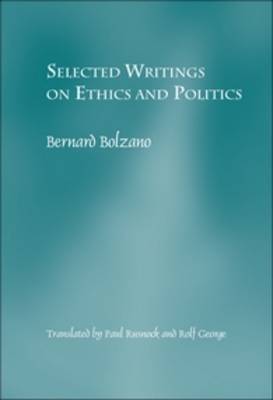Studien Zur Osterreichischen Philosophie
1 primary work
Book 40
Celebrated today for his groundbreaking work in logic and the foundations of mathematics, Bernard Bolzano (1781-1848) was best known in his own time as a leader of the reform movement in his homeland (Bohemia, then part of the Austrian Empire). As professor of religious science at the Charles University in Prague from 1805 to 1819, Bolzano was a highly visible public intellectual, a courageous and determined critic of abuses in Church and State. Based in large part on a carefully argued utilitarian practical philosophy, he developed a non-violent program for the reform of the authoritarian institutions of the Empire, which he himself set in motion through his teaching and other activities. Rarely has a philosopher had such a great impact on the political culture of his homeland.
This volume contains a substantial collection of Bolzano's writings on ethics and politics, translated into English for the first time. It includes a complete translation of the treatise On the Best State, his principal writings on ethics, an essay on the contemporary situation in Ireland, and a selection of his Exhortations, dealing with such topics as enlightenment, civil disobedience, the status of women, anti-Semitism and Czech-German relations in Bohemia. It will be of particular interest to students of central European philosophy and history, and more generally to philosophers and historians of ideas.
This volume contains a substantial collection of Bolzano's writings on ethics and politics, translated into English for the first time. It includes a complete translation of the treatise On the Best State, his principal writings on ethics, an essay on the contemporary situation in Ireland, and a selection of his Exhortations, dealing with such topics as enlightenment, civil disobedience, the status of women, anti-Semitism and Czech-German relations in Bohemia. It will be of particular interest to students of central European philosophy and history, and more generally to philosophers and historians of ideas.
